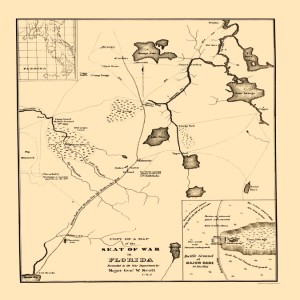
Saturday Nov 28, 2020
SW032 Frank Laumer and Co. Blaze New Path on an Old Trail in 1963, Retracing Fatal Steps of Major Dade's 1835 March along Fort King Military Road

Maj. Gen. Winfield Scott published a map of central Florida detailing the route of Dade's 1835
march along the Fort King Military Road from Fort Brooke, in Tampa to Fort King in Ocala. The
column never arrived.
[Editor's Note: This is the fourth in a series of podcasts over the coming weeks promoting the Seminole Wars Foundation's virtual challenge, The Major Dade Memorial March to Fort King that launches Dec. 22. Registration to join Laumer's Legion is now open. Visit www.seminolewars.us for details.]
In this episode, we present an adaptation of William Goza’s Fort King Road 1963 booklet. Although Mr. Goza has passed away, along with Frank Laumer, a participant from that 1963 march still lives today. Frank Laumer’s son, Christopher, now age 69, walked part of the route with the men when he himself was 12 years of age. It is our distinct pleasure to welcome Chris to our podcast to read the first-person portions of William Goza’s account of the first march to specifically mark that trail since Major Dade himself trod it with his doomed 108-man detachment of artillery and infantry soldiers in 1835.
Background:
In 1963, land developer Frank Laumer and Clearwater attorney William Goza, joined by a St Leo College student, Jim Beck, decided to take a little hike in the country, tracing the path of Major Dade’s ill-fated column from Tampa to present-day Bushnell, Florida.


Frank Laumer and Co. (above) arrive at Dade Battlefield Historic State Park in December 1963 and
accepts greetings from the Park Superintendent. In the 2010s, Frank Laumer (above right) gives a
public address at Dade Battlefield Historic State Park.
The trek attracted many camp followers – and a few members of the news media. The men had successfully re-established a walking trail that mirrored that of Major Dade in 1835. They donated copies of their maps to the Dade Battlefield Historic State Park and to the Florida Historical Society. And William Goza dedicated himself to drafting an account of their motivations, planning, and many-day journey to the site of what was then still called “The Dade Massacre.” The product of that work became a short booklet, The Fort King Road 1963.

William Goza, who died in 2008 at age 90, lived a long and prosperous life as an attorney and municipal judge, after serving honorably as a battery commander during World War II. But his true passion traced a different route, that of Florida history and forensic science. Twice president of the Florida Historical Society, William Goza was a life-long student of the Seminole Wars and a board member of the Seminole Wars Foundation. He participated in many Dade Battle talks and participated in the acquisition of the US Army Lt. Henry Prince Seminole War diary at the University of Florida in Gainesville.

Mr. Goza participated in the investigations of the circumstances surrounding the deaths of President (and one-time Florida War commanding general) Zachary Taylor, the Spanish conquistador Francisco Pizzaro, and Joseph Merrick, the so-called “Elephant Man.” This work in forensics is believed to have influenced his good friend, Frank Laumer to seek answers about Dade Battle survivor, Ransom Clark, by having his remains exhumed and examined by a professional pathologist. This confirmed that all Private Clark had stated about his battle wounds was true.
Frank Laumer was instrumental in getting a new VA headstone for battle survivor Ransom Clark. He acquired and donated the legacy headstone to the Tampa Bay History Center. (below)


The 1963 march attracted much news media attention. Chris Laumer, who narrates William Goza's
first-person portions of the trek account, is pictured in a photo in the top news article. A Miami
newspaper (below) organized a mock Seminole ambush, led by Chairman Howard Osceola, as
Frank Laumer's party approached the famous Dade's Breakfast Pond, four miles shy of the Dade
Battlefield. All survived and a friendly campfire cookout followed.

Host Patrick Swan is a board member with the Seminole Wars Foundation. He is a combat veteran and of the U.S. Army, serving in Iraq, Afghanistan, Kuwait, and Kosovo, and at the Pentagon after 9/11. A military historian, he holds masters degrees in Public History, Communication, and Homeland Security, and is a graduate of the US Army War College with an advanced degree in strategic studies. This podcast is recorded at the homestead of the Seminole Wars Foundation in Bushnell, Florida.
Like us on Facebook, LinkedIn, and YouTube. Get the latest episode without delay where and when you want it by subscribing through your favorite podcast provider, such as iHeart, Stitcher, Spotify, DoubleTwist, Pandora, Podbean, Google podcasts, iTunes or directly from the Seminole Wars Foundation website at www.seminolewars.us
No comments yet. Be the first to say something!